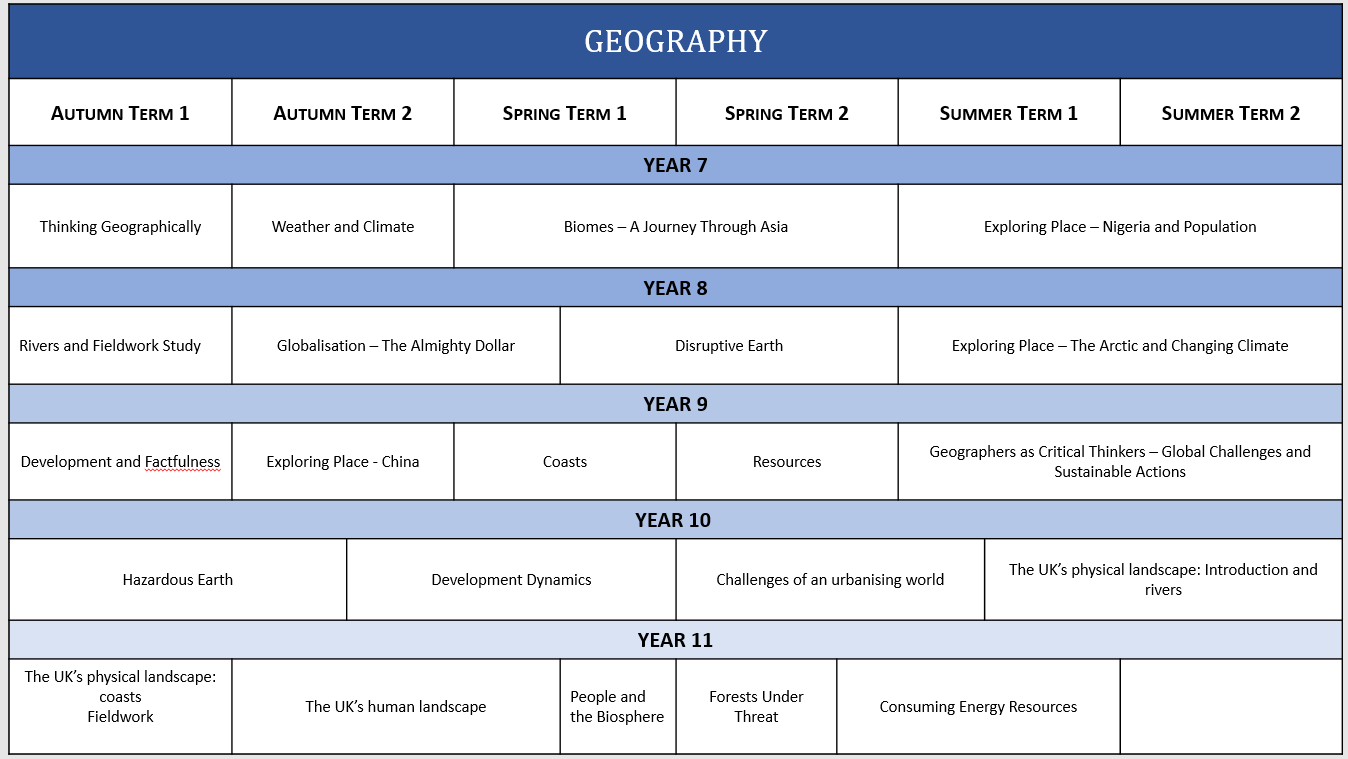Geography
Geography is a popular subject at GCSE, AS and A2 level with many students opting to pursue a University course based on a Geographical subject specialism.
The drive behind the geography curriculum is to provide students with knowledge of the world around them and teach them the skills they need to understand the processes that affect their environment. The curriculum covers a wide range of topics that are equally balanced between human and physical geography and includes case studies from many different countries. The result is that the curriculum appeals to all students at Bishop Douglass School. Students will be expected to understand geographical events and processes at a variety of scales, evaluate the causes and impacts and appreciate the interdependence between people and places. By doing so, they have a firm understanding of the processes and events that affect the environment that we live in and they are able to apply their understanding to understand and interpret other geographical events and processes.
The department benefits from two passionate teachers who each bring their own fields of expertise to the planning of lessons and the knowledge that can be shared with students. The two teachers have developed specialist knowledge in human and physical geography to complement each other.
Geography through the Key Stages
The Key Stage 3 curriculum is taught in holistic topics to engage the learners with geographical knowledge that will aid them in the future. Students are provided with basic geographical skills such as the ability to describe locations, describe data and analyse maps, graphs and pictures. Learners will be able to describe the world that they live in and explain how humans and the physical world interact.
Topics are then ordered so that thy build on the base skills so that students develop a more complex understanding of geographical processes such as coasts and rivers as well as learning about how the world has become more interconnected. Each topic has different connected skills that are highlighted. For example, in biomes learners will learn to interpret graphs and use data analysis skills that they have learnt previously whereas in development learners interact with tables of information and learn how to extract useful information. These reinforce the numeracy and literacy skills learnt it other subjects. The history and geography curricula have several overlapping areas of study approached from different angles that strengthens the knowledge gained in context. Throughout all topics in key stage 3 and 4, learners are taught extended writing to prepare them for the longer questions at GCSE and A Level. All disciplinary skills are taught in a ‘stage-appropriate’ manner so that they are fully accessible.
Key Stage 3
The Key Stage 3 course has been developed to engage and inspire students and instil in them a curiosity to find out more about the world that they live in.
We aim to deepen our students’ understanding about the diverse world they live in and equip them with key geographical skills such as enquiry, resource interpretation and fieldwork.
The curriculum consists of a balance of physical and human topics that are relevant in today’s changing world and regularly include current affairs and news from around the world.
During Year 7 the students cover: weather and climate, biomes, sustainability, population, rivers and tectonics. A wide range of relevant places and countries are used as case studies and the students are taught many new and important skills that they will use throughout their geographical studies.
During Year 8 the students cover: development, the Arctic, climate change, globalisation and coasts. As with Year 7 students are taught using a range of relevant case studies from different places around the world.
Key Stage 4
The KS4 course builds on the skills and content learnt in KS3 and the topics covered are a balance of physical and human geography. We study the Edexcel GCSE Geography B syllabus and aim to include many exciting and relevant case studies throughout.
The course includes the following topics: hazardous earth, development dynamics, challenges of an urbanising World, the UK’s physical environment, the UK’s human environment, fieldwork, people and the biosphere, forests under threat and consuming energy.
Key Stage 5
Geography’s balance between humanities and sciences makes it a strong A-level subject that is extremely valuable no matter what students decide to go on to study. There is some familiar but more detailed content from KS4 however it is the new topics that stretch a student’s geographical knowledge and understanding to a greater level.
A-level geography again consists of a balance of physical and human geography that includes topics such as: geopolitics, changing places, water and energy insecurity and the carbon cycle.
Curriculum Map

Enrichment Opportunities
Trips for geography students are organised in Year 9 and 10, in Year 11 students complete two days of guided fieldwork (one physical day studying coasts at Walton on the Naze and one human day studying variations in quality of life within London) and teachers frequently take students on class trips in Year 7 and 8. Destinations in recent years have included London Zoo, the National History Museum, Greenwich observatory and planetarium and Hampstead Heath. At sixth form, students have an increased focus on independent fieldwork, there are two guided day trips to help develop their understanding of key concepts (one coastal day and one urban day studying regeneration), students then complete two days of independent data collection (data collected is used for their coursework). Finally, there is an option for sixth form students to go on a trip to Naples to support their studies in the field of tectonics.
For further information please contact us via email - schooladmin@bishopdouglass.barnet.sch.uk





